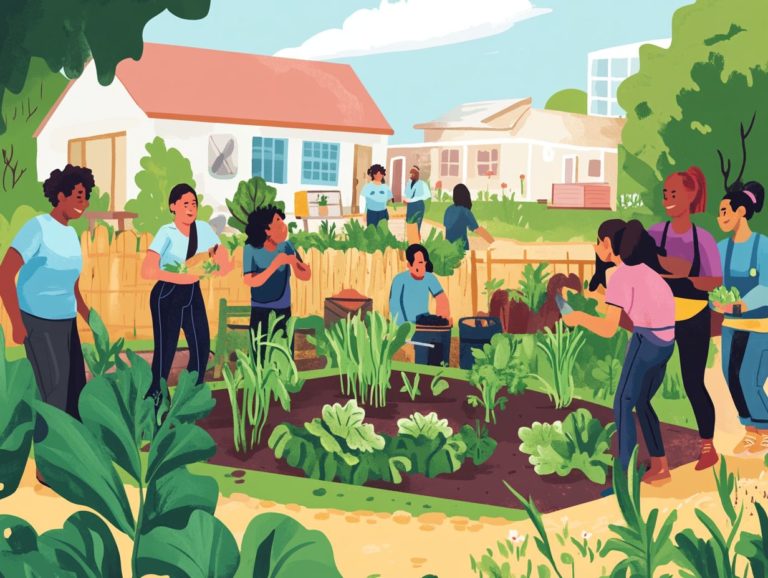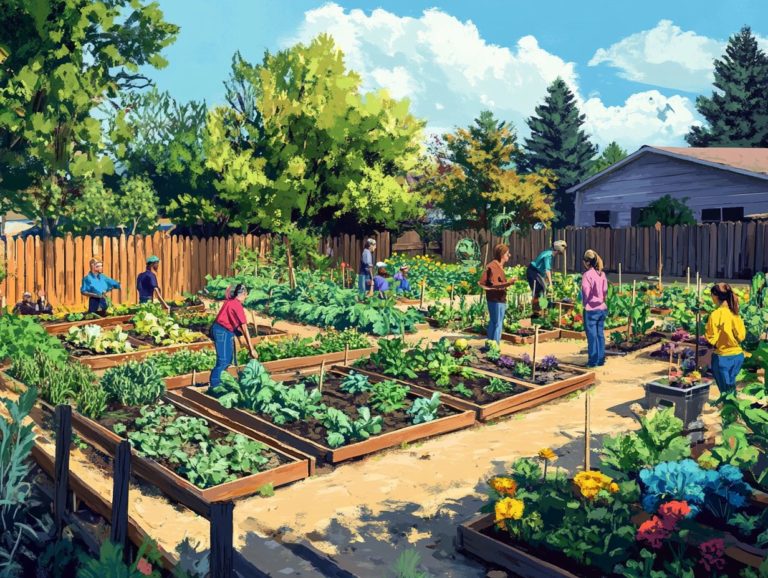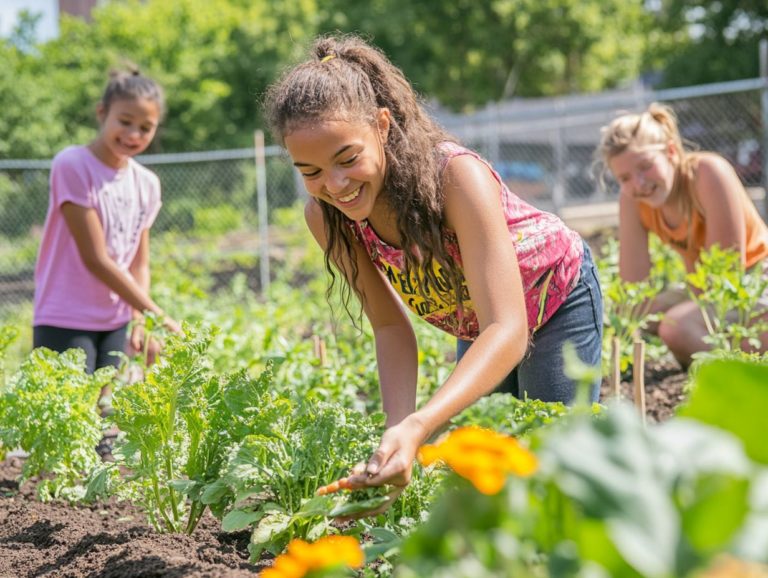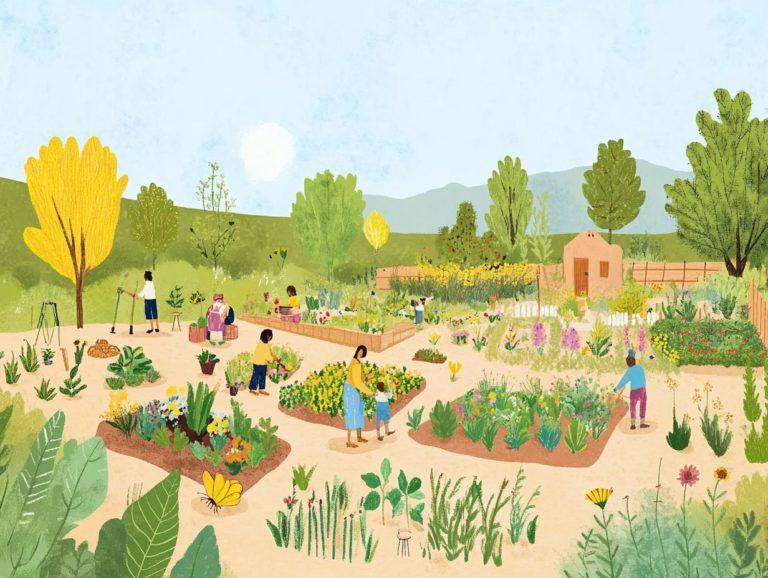11. How to Organize a Permaculture Workshop Locally
Permaculture presents a comprehensive approach to sustainable living, seamlessly weaving together agriculture, ecology, and community.
By organizing a local permaculture workshop, you cultivate knowledge and reinforce the bonds within your community. This article explores the many benefits of these workshops, covering essential aspects like planning, budgeting, marketing strategies, and logistics.
You ll also find insights into evaluating the success of your event and maintaining connections with participants long after it concludes. Immerse yourself in these insights to learn how you can inspire sustainable practices in your community!
Contents
- Key Takeaways:
- Benefits of Organizing a Local Permaculture Workshop
- Planning and Preparation for a Permaculture Workshop
- Marketing and Promoting the Workshop
- Logistics of the Workshop
- Post-Workshop Reflection and Follow-Up
- Frequently Asked Questions
- 1. What is a Permaculture Workshop?
- 2. Why should I organize a Permaculture Workshop locally?
- 3. How do I find instructors for the workshop?
- 4. Where should I host the workshop?
- 5. How can I promote my Permaculture Workshop?
- 6. Do I need any special equipment for the workshop?
- 7. What are the benefits of attending a Permaculture Workshop?
Key Takeaways:

- Organizing a local permaculture workshop can bring the community together and educate them on sustainable methods for growing food.
- Proper planning and preparation, including identifying goals and creating a budget, are crucial for a successful workshop.
- Marketing the workshop through both traditional and online platforms, while staying connected with participants after the event, can help ensure its success.
What is Permaculture?
Permaculture represents a groundbreaking and sustainable design system that aims to create agricultural landscapes that are both harmonious and self-sufficient. By blending permaculture principles with local climate insights and recognizing specific environment conditions, you foster ecological integrity and embrace sustainable living practices.
This approach enhances food production while preserving vital natural resources. It underscores the significance of biodiversity, soil health, water management, and permaculture ethics, which are essential for nurturing resilient ecosystems beneficial to both individuals and the planet.
The core principles of permaculture advocate for caregiving, keen observation of natural patterns, and the strategic yielding of surplus. These concepts apply in various contexts, from your own backyard garden to expansive community initiatives.
For example, in a small garden, you might use methods like food forestry planting a diverse array of fruit and nut trees alongside companion plants to create more efficient and productive spaces.
Incorporating composting practices enriches your soil and minimizes waste, beautifully reflecting the permaculture ethic of recycling resources. As communities unite to establish community gardens, these principles can cultivate collective food sovereignty, strengthen social ties, and inspire sustainable practices that extend beyond the garden into everyday life.
Benefits of Organizing a Local Permaculture Workshop
Organizing a local permaculture workshop provides numerous benefits that enhance community engagement and promote sustainable practices. To spread the word effectively, consider checking out resources on how to promote local permaculture events. These workshops are a fantastic opportunity to dive into permaculture and make lasting connections!
They also serve as impactful fundraising events to support local ecological initiatives, creating a ripple effect of positive change within the community.
Community Building and Education
Community building and education are essential to any thriving local permaculture workshop, cultivating collaboration and a unified understanding of sustainable practices. By connecting participants through community gardens and offering permaculture courses specifically designed for the local climate, these workshops significantly enhance knowledge, skills, and motivation toward sustainable living.
This collaborative environment fosters individual growth and strengthens social ties within the community. Consider a community garden in an urban neighborhood; it yields fresh produce and acts as a vibrant gathering space where local residents can exchange ideas and resources.
Such gardens often transform into incubators for creativity, inspiring residents to embark on projects like rainwater harvesting and composting initiatives. Successful endeavors, such as the Edible Schoolyard Project in Berkeley, California, showcase how education can revolutionize both local ecosystems and community relationships, leading to profound environmental and social impacts.
Join us in creating a sustainable future! Start planning your own workshop today!
Planning and Preparation for a Permaculture Workshop
Planning and preparing for a permaculture workshop sets the stage for success. These steps create engaging learning experiences and foster community spirit, especially when you learn how to leverage local resources for permaculture.
This process requires you to create a comprehensive design plan that outlines your goals, budget, and timeline for the workshop, while also considering the unique needs and resources of your community.
Identifying Goals and Objectives
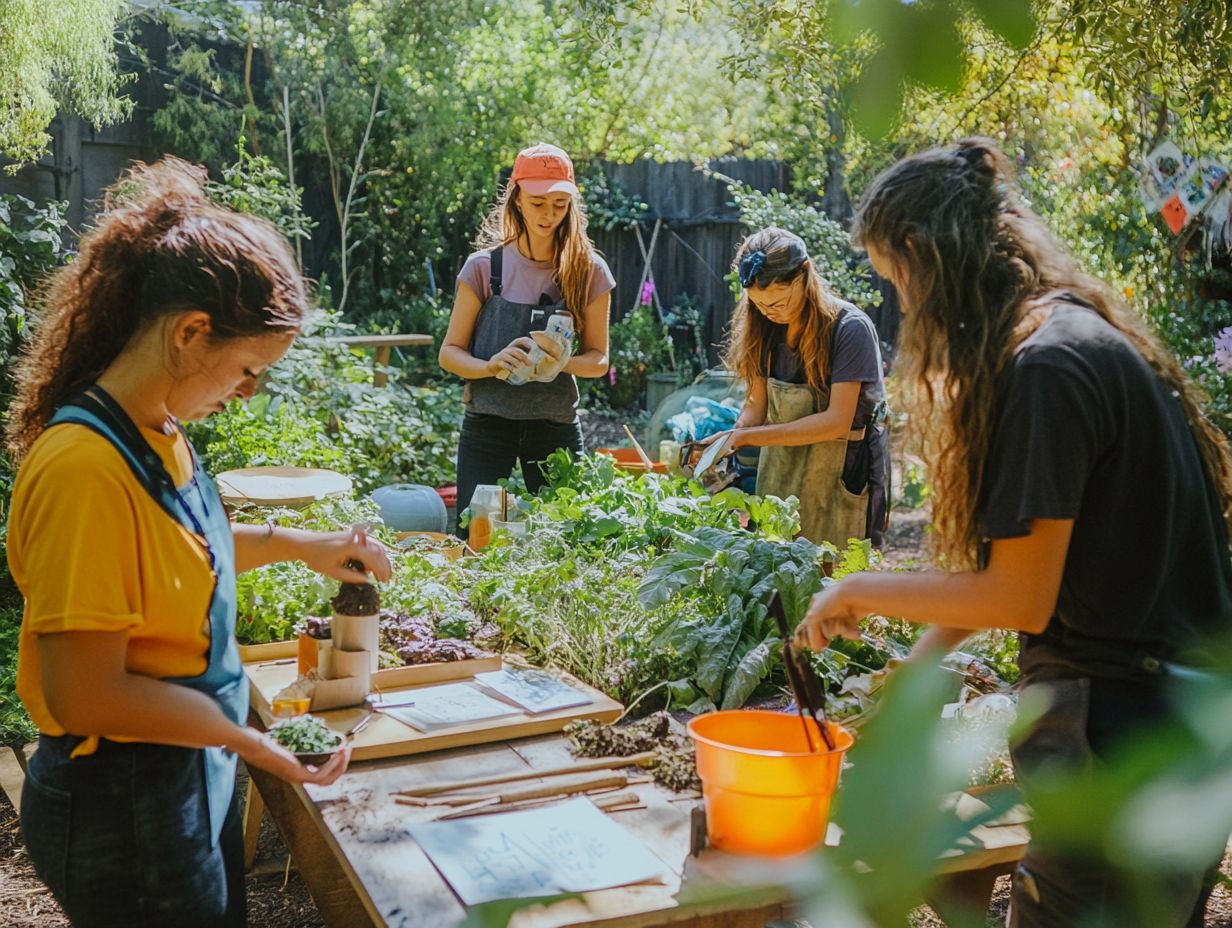
First, identify your goals. Do you want to educate people on permaculture design or promote collaboration using local resources? Clear goals and objectives are essential to laying the groundwork for the event.
Taking the time to assess the specific needs of your community ensures that the content resonates with potential participants. Understanding the local ecological context and socio-economic conditions allows you to integrate relevant topics like soil health or water conservation into the workshop.
Engaging local experts can enhance the experience, making the workshop both informative and practical. Aligning these objectives with community aspirations creates an inclusive environment that encourages participants to develop community leadership in permaculture practices.
Creating a Budget and Timeline
Creating a detailed budget and timeline is your ticket to a fantastic workshop! This ensures efficient resource allocation and smooth event execution.
Outline potential expenses, find funding sources, and create a timeline that fits preparation and marketing activities. Start by breaking down anticipated costs, including materials, venue rental, advertising, and potential honorariums for guest speakers.
Consider exploring diverse funding sources, such as local grants, sponsorships, or partnerships with community organizations that align with your ethos. Accurately estimating costs provides a buffer against unexpected expenses.
A well-structured timeline keeps everything on track. Engaging with the community for feedback can enhance the workshop content and delivery, ensuring it meets their specific needs and fosters a meaningful experience.
Marketing and Promoting the Workshop
Effective marketing and promotional strategies are crucial for drawing participants to your permaculture workshop, helping your event resonate with a broad local audience.
Use flyers and word-of-mouth alongside social media to attract participants. These strategies will boost visibility and engagement.
Reaching Out to the Local Community
Engage your community through outreach efforts. Host meetings to share ideas and showcase the benefits of permaculture. This ensures that interested individuals feel included and valued.
Employ various outreach techniques to cultivate a sense of belonging and partnership. Community meetings serve as ideal platforms for individuals to gather, share their ideas, and voice their concerns.
Collaborating with local organizations enhances these efforts, allowing you to share resources and amplify your message. By fostering an inclusive environment that welcomes diverse perspectives, your outreach initiatives can strengthen community ties and promote a shared vision for sustainability.
Using Social Media and Online Platforms
Using social media and online platforms is a powerful strategy for marketing your permaculture workshop. It allows you to reach a wider audience and connect with participants actively.
By implementing targeted campaigns and sharing informative posts about your permaculture courses, you can provide potential participants with valuable insights into the workshop s worth and relevance.
To maximize your outreach, focus on creating eye-catching content that highlights hands-on activities and ecological benefits. Think about videos that showcase sustainable practices in action.
Understanding your target audience is vital. Research their demographics and interests to craft tailored messages that resonate. Engage with your followers by responding to comments, hosting Q&A sessions, or sharing success stories from past participants to cultivate a sense of community.
By tracking engagement metrics measuring how many likes, shares, and clicks your posts get you ll refine your strategies, ensuring they connect effectively with your audience and drive registrations for your workshop.
Logistics of the Workshop
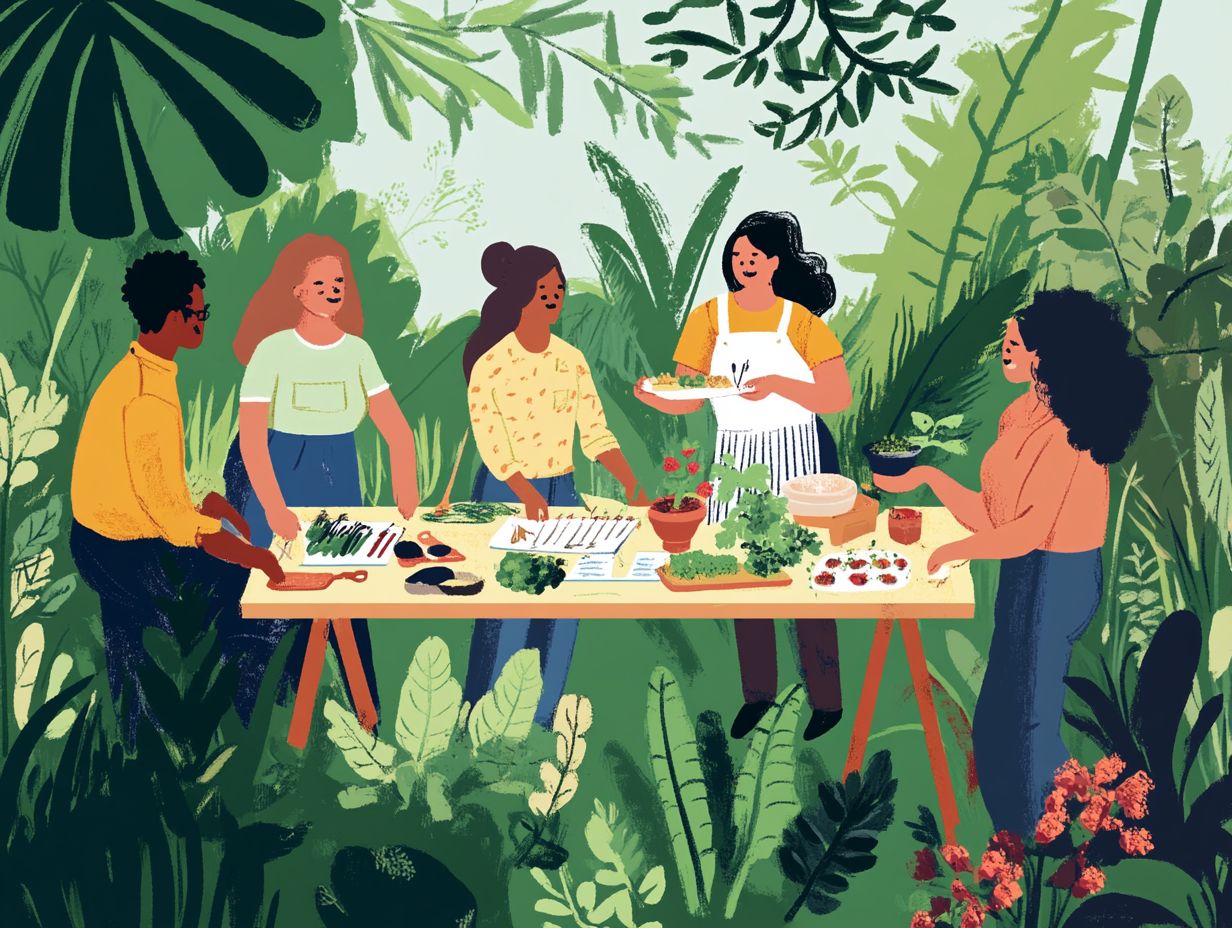
Managing the logistics of a permaculture workshop requires meticulous planning and coordination to create a truly successful experience for every participant. You’ll want to select a venue that aligns perfectly with the workshop’s goals, ensuring it inspires and facilitates learning. For insights on what to expect at these gatherings, check out what to expect from permaculture community events.
Organizing qualified speakers who can share valuable insights is key to making your workshop a hit! Planning engaging activities and hands-on projects that actively involve attendees will enrich their understanding.
Choosing a Venue and Setting Up
Choosing the right venue and setting it up effectively is crucial for the success of your permaculture workshop; it can significantly impact participant engagement and learning outcomes.
Consider ideal venues like community gardens, local farms, or educational institutions that embody the local climate and utilize available community resources.
When selecting the perfect spot, keep accessibility in mind. Ensure that all participants can easily reach the location, especially those who rely on public transportation or may face mobility challenges.
Essential resources such as water supply, soil quality, and existing plant life are key for facilitating hands-on activities. Creating a welcome atmosphere is also vital arranging seating in a circle, making use of natural shade, and incorporating interactive elements can encourage discussion and collaboration.
This thoughtful preparation not only fosters an engaging learning environment but also enhances the overall experience for everyone involved.
Organizing Speakers and Activities
Organizing knowledgeable speakers and engaging activities is crucial for a successful permaculture workshop, amplifying your learning experience. Additionally, consider hosting a permaculture potluck to foster community engagement. By inviting experts in permaculture design and incorporating hands-on projects, you gain practical insights while applying your knowledge in real-world scenarios.
Careful selection of speakers ensures their expertise aligns with the workshop’s themes and objectives, fostering a cohesive learning environment. Consider the interests of the participants and current trends in permaculture when curating the lineup.
Integrating hands-on projects allows you to dive deep into the subject matter, enhancing retention and sparking creativity. Activities like creating garden designs or conducting soil tests not only solidify concepts but also encourage collaboration among participants, cultivating a community of learning that extends far beyond the workshop.
Post-Workshop Reflection and Follow-Up
Post-workshop reflection and follow-up are crucial for evaluating the success of a permaculture workshop and ensuring continuous improvement for future events. Collecting feedback from participants allows you to assess the workshop’s effectiveness and cultivate a sense of community.
This practice sparks ongoing engagement and excitement within your community, enriching the experience for everyone involved.
Evaluating Success and Gathering Feedback
Evaluating the success of a permaculture workshop and collecting feedback from participants is essential for understanding the event’s impact and refining future efforts. By utilizing surveys, interviews, and informal discussions, you can gain valuable insights into participant engagement and assess how well the workshop aligned with permaculture ethics.
Incorporating focus groups can offer deeper insights, allowing you to explore specific elements that resonated or fell short. Analyzing participant perspectives is crucial as it highlights the strengths and weaknesses of the current curriculum while helping you tailor future workshops to better meet the audience’s needs.
Collecting data through various methods enables you to identify common themes or suggestions for improvement, ultimately enhancing the learning experience. Ensuring that feedback is both comprehensive and actionable allows you to continuously evolve and deliver valuable sessions that align closely with the principles of permaculture.
Staying Connected with Participants
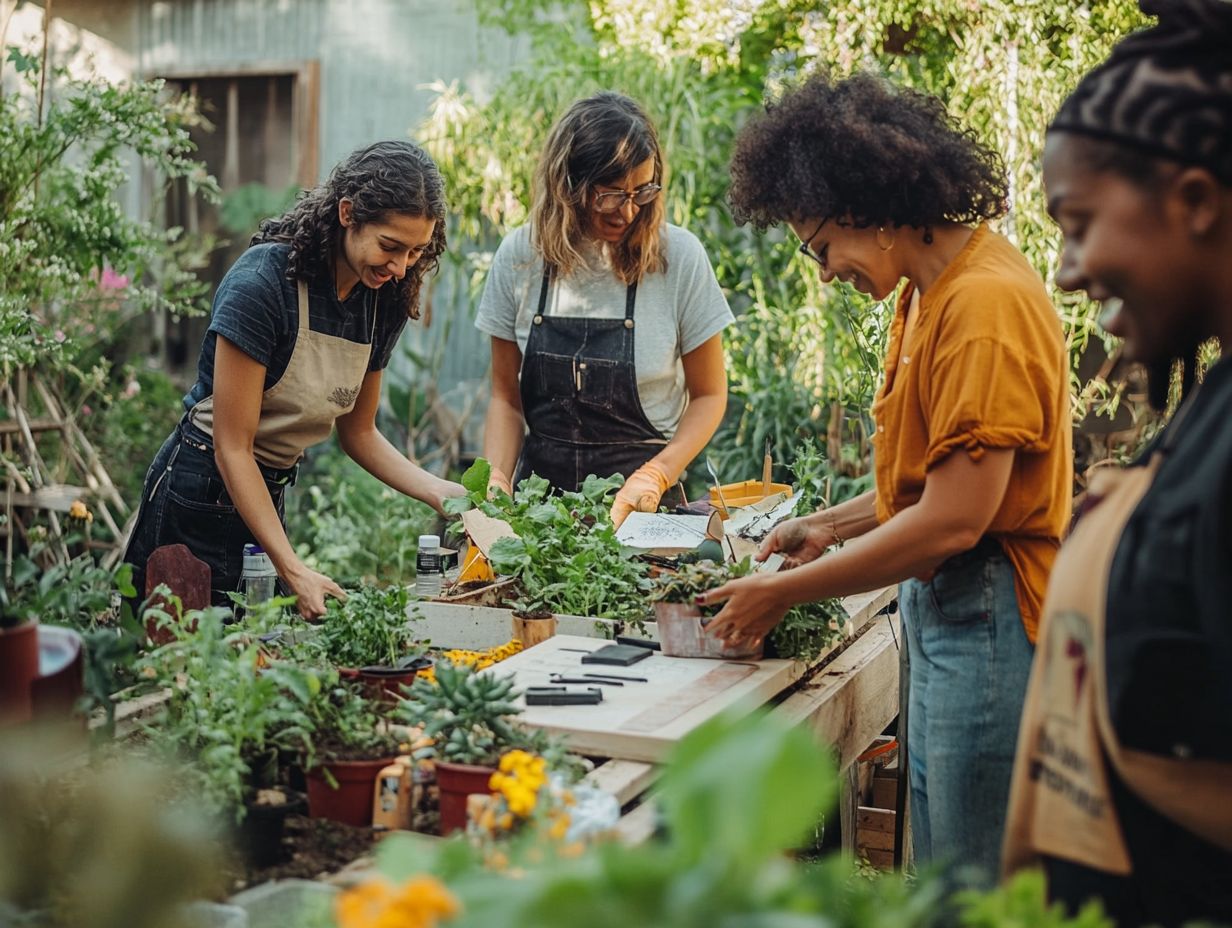
Staying connected with participants after a permaculture workshop is crucial for nurturing a supportive community and fostering ongoing engagement with sustainable practices. By leveraging community resources and offering follow-up permaculture courses or events, you can help participants continue their learning journey and apply their knowledge in real-world settings.
Implement regular newsletters to share updates, success stories, and valuable resources, keeping that enthusiasm alive. Establishing social media groups allows participants to interact, share experiences, and ask questions, creating a vibrant digital space that encourages collaboration.
These strategies not only reinforce the concepts they’ve learned but also cultivate a sense of belonging within the permaculture movement. Ultimately, ongoing engagement strengthens relationships in the community, creating a resilient network that supports sustainable practices long after the initial workshop wraps up.
Frequently Asked Questions
1. What is a Permaculture Workshop?
A permaculture workshop is an educational event that focuses on teaching sustainable methods for designing and maintaining human-made systems, such as gardens, farms, and homes.
2. Why should I organize a Permaculture Workshop locally?
Organizing a permaculture workshop locally helps spread awareness and knowledge about sustainable methods to your community. For more guidance, check out how to start a permaculture group in your area. You’ll create an amazing community of like-minded individuals!
3. How do I find instructors for the workshop?
You can reach out to local permaculture organizations, farms, or individuals who have expertise in permaculture. Use social media or community bulletin boards to spread the word and find potential instructors.
4. Where should I host the workshop?
The location of your workshop will depend on the size and type of event you are organizing. Consider hosting it at a community center, local farm, or even your own backyard. Choose a space that is easily accessible and has enough room for activities and demonstrations.
5. How can I promote my Permaculture Workshop?
You can promote your workshop through social media, local newspapers and magazines, community bulletin boards, and word of mouth. Highlight the benefits of attending the workshop and the expertise of your instructors.
6. Do I need any special equipment for the workshop?
It depends on the activities and demonstrations planned for the workshop. Generally, it’s useful to have basic gardening tools, such as shovels, hoes, and gloves, as well as presentation materials like a whiteboard or projector. You can also ask participants to bring their own tools and materials if needed.
7. What are the benefits of attending a Permaculture Workshop?
Attending a permaculture workshop provides hands-on experience, connects you with local experts, and helps you learn sustainable methods that you can apply in your own life. Join us today and start your permaculture journey!


